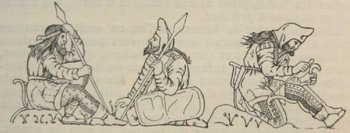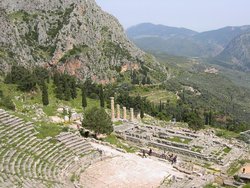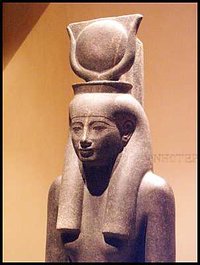The Histories of Herodotus
|
|
The Histories of Herodotus by Herodotus is considered the first work of history in Western literature. Written about 440 B.C., The Histories tells the story of the war between the Persian Empire and the Greek city states in the 5th century B.C. Herodotus traveled extensively around the ancient world, conducting interviews and collecting stories for his book. At the beginning of The Histories, Herodotus set out his reasons for writing it:
Herodotus of Halicarnassus here displays his enquiry, so that human achievements may not become forgotten in time, and great and marvellous deeds – some displayed by Greeks, some by barbarians – may not be without their glory; and especially to show why the two peoples fought with each other. (Aubrey de Selincourt translation)
The Histories is divided into nine books, each named after one of the Muses. The rise of the Persian Empire is chronicled, and the causes for the conflict with Greece. Herodotus treats the conflict as an ideological one, frequently contrasting the absolute power of the Persian king with the democratic government of the Greeks. The Histories contains a famous account of the Battle of Marathon, of which Herodotus wrote:
So when the battle was set in array, and the preliminary sacrifice promised success, instantly the Athenians, so soon as they were let go, charged the barbarians at a run. Now the distance between the two armies was little short of eight furlongs. The Persians, therefore, when they saw the Greeks coming on at speed, made ready to receive them, although it seemed to them that the Athenians were bereft of their senses, and bent upon their own destruction; for they saw a mere handful of men coming on at a run without either horsemen or archers. Such was the opinion of the barbarians; but the Athenians in close array fell upon them, and fought in a manner worthy of being recorded. (unknown translation)
| Contents |
Storyline
Book I (Clio)
- The rulers of Lydia (on the west coast of modern Turkey): Candaules, Gyges, Alyattes, Crœsus
- How Gyges took the kingdom from Candaules
- The singer Arion's ride on the dolphin
- Solon's answer to Crœsus's question about who was the happiest person in the world
- Crœsus's efforts to protect his son Atys
- Crœsus's test of the oracles
- The answer from the Oracle of Delphi concerning whether Crœsus should attack the Persions (famous for its ambiguity): If you attack you will destroy a mighty empire
- Crœsus's defeat by Cyrus, and how he later became Cyrus's advisor
- The rulers of the Medes: Deioces, Phraortes, Cyaxares, Astyages, Cyrus
- The rise of Deioces over the Medes
- Astyages's attempt to destroy Cyrus, and Cyrus's rise to power
- The culture of the Persians
- The history and geography of the Ionians
- The culture of Assyria, especially the design and improvement of the city of Babylon and the ways of its people
- Cyrus's attack on Babylon, including his revenge on the river Gyndes and his famous method for entering the city
- Cyrus's ill-fated attack on the Massagetæ
Book II (Euterpe)
- The proof of the antiquity of the Phrygians by the use of children unexposed to language
- The geography of Egypt
- Speculations on the Nile river
- The religious practices of Egypt, especially as they differ from the Greeks
- The animals of Egypt: cats, dogs, crocodiles, hippopotamuses, otters, phœnixes, sacred serpents, winged snakes, ibises
- The culture of Egypt: medicine, funeral rites, food, boats
- The kings of Egypt: Mên, Nitocris (queen), Mœris, Sesostris, Pheron, Proteus
- Helen and Alexander's stay in Egypt during the Trojan war
- More kings of Egypt: Rhampsinitus (and the story of the clever thief), Cheops (and the building of the Great Pyramid), Chephren, Mycerinus, Asychis, Anysis, Sethôs
- The line of priests
- The Labyrinth
- More kings of Egypt: the twelve, Psammetichus (and his rise to power), Necôs, Psammis, Apries, Amasis II (and his rise to power)
Book III (Thalia)
Persepolis_1.JPG
- Cambyses's (son of Cyrus and king of Persia) attack on Egypt, and the defeat of the Egyptian king Psammenitus
- Cambyses's abortive attack on Ethiopia
- The madness of Cambyses
- The good fortune of Polycrates king of Samos
- Periander, the king of Corinth and Corcyra, and his obstinate son
- The revolt of the two Magi in Persia and the death of Cambyses
- The conspiracy of the seven to remove the Magi
- The rise of Darius king of Persia
- The twenty satrapies
- The culture of India and their method of collecting gold
- The culture of Arabia and their method of collecting spices
- The flooded valley with five gates
- Orœtes's (governor of Sardis) scheme against Polycrates
- The physician Democêdes
- The rise of Syloson governor of Samos
- The revolt of Babylon and its defeat by the scheme of Zopyrus
Book IV (Melpomene)

- The history of the Scythians (from the land north of the Black Sea)
- The geography of Scythia
- A comparison of Libya (Africa), Asia, and Europe
- The rivers of Scythia
- The culture of the Scythians: religion, burial rites, xenophobia (the stories of Anacharsis and Scylas), population
- The beginning of Darius's attack on Scythia, including the bridge over the Bosphorus
- The brutal worship of Zalmoxis by the Getæ
- The customs of the surrounding peoples
- The wooing of the Amazons
- Darius's attack on Scythia
- The story of the Minyæ (descendants of the Argonauts) and the founding of Cyrêné
- The rulers of Cyrêné: Battus, Arcesilaüs, Battus the lame (and the reforms of Demônax), Arcesilaüs (his revolt and death)
- The peoples of Libya from east to west
- The revenge of Arcesilaüs's mother Pheretima
Book V (Terpsichore)
Book VI (Erato)
Miltiades.jpg
- Book 6 begins in the middle of the Ionian revolt against the Persians, the Ionians, helped by the Athenians, have burnt down the Persian town of Sardis. Sparta refused to help the Ionians.
- Histiaeus flees from Darius, king of Persia, to Chios.
- Dionysius offered to train the Ionians, they accepted and he made them practise rowing for several days.
- The Ionians would prefer to be enslaved and made into eunuchs (the Persian punishment for rebellion) rather than practise rowing for a few days, so put their boats ashore and relaxed.
- The Samian commanders decided to withdraw from the Ionian confederacy due to the nonchalance of the other Ionians, and later abandoned their place in the Ionian line during the sea-battle.
- The Persians won in a naval battle against the Ionians due to dissention in the Ionian ranks; hence the Persians regained control and reduced the Ionians to slavery.
- Histiaeus captured by Harpagus and killed rather than being taken to Darius.
- Mardonius is sent to attack Greece with a large military and naval force {492 BC}, and manages to enslave Macedonia.
- As his fleet made its way around Athos there was a storm and c.300 ships were lost (20,000 men), Mardonius returns to Persia in disgrace.
- The next year Darius orders Greek city-states to give him soil and water, most consented, among them was the island of Aegina.
- The Athenians immediately took this as a sign of the islanders being traitors to Greece, and enlist the Spartan king's, Cleomenes, help in dealing with them.
- Cleomenes travels to Aegina to arrest the traitors, who are taken to Athens
- Digression on the patronage of Demaratus, the other king of Sparta, followed by his being deprived of office. Demaratus flees to Persia and Leotychides, Demaratus’ kinsman, succeeds him.
- Herodotus, always wishing to include some moral lessons in his Histories tells us how the people involved were punished; Cleomenes later commits suicide in a fit of madness.
- Aegina tries, in vain, to retrieve its hostages from Athens, which adds to the tension between them.
- The Persians then lay siege the town of Eretria, and eventually take it, the Eretrians had appealed for Athenian help, which was given in the form of 3000 men but the Eretrians eventually decided to send them away.
- The Athenians sent Pheidippides, who met the god Pan on the way, to Sparta to ask for help against the Persians at Marathon, the Spartans refuse due to religious scruples. They arrived at Marathon after the battle had taken place. The Plataeans agree to help the Athenians.
- The Persians landed at Marathon, 490 BC, and are guided by Hippias, son of Pisistratus (one of the former tyrants of Athens).
- Miltiades, son of Cimon, and eleven other strategoi lead the Athenians. The Athenians and Plataeans defeat the Persians in a incredible victory.
- The Athenians must run back to Athens in order to prevent the Persians from attacking the city. Digression on the history of the Alcmaeonidae and how they came about their wealth.
Book VII (Polymnia)
Trireme.jpg
- Book seven starts with Darius amassing a vast army in order to attack Greece after learning about his defeat at Marathon.
- We then learn of a quarrel between two of Darius’ sons over who should succeed him, Xerxes wins and after Darius’ death, in 486 BC, becomes king
- Xerxes sends an army against the Egyptian rebels and defeats them.
- Xerxes is persuaded by Mardonius to invade Greece, but Artabanus attempts to persuade him that it’s not a good idea, which angers Xerxes.
- Xerxes has 2 dreams featuring a phantom that first persuades him to stop the war against Greece then makes him change his mind again.
- Preparations for the invasion are made.
- Xerxes has a canal dug to shorten the rout his fleet would take and also to turn the inhabitants of Athos into islanders.
- Xerxes marches at the head of his army to Greece
- Xerxes is entertained by Pythius, a Lydian, in c.480 BC, who offers to give Xerxes all his money. An offer that Xerxes refuses and instead gives him 7000 gold Darics as a reward for his generosity. Xerxes later cuts Pythius’ eldest son in half and marches his army away between the two halves.
- In Sardis Xerxes sent representatives to every Greek state, except Athens and Sparta, with a demand for earth and water, and for them to prepare entertainment for him when he arrives in each state.
- At Abydos two bridges were built across the Hellespont, one by the Egyptians and the other by the Phoenicians, these bridges are destroyed by a storm and are rebuilt after Xerxes, in his anger, 'punished' the Hellespont.
- Many Greek states medize; Thessaly, Thebes (suspected only though), Melians.
- Oracle says a 'wooden wall' will save Athens – Themistocles deduces that this means the Athenian fleet.
- Greeks peoples unite however Argos medized; Gelon of Syracuse (Sicily) refuses to help unless he can lead at least part of the army, the Spartans bluntly refuse, hence Gelon does not help; Corcyra dissembles, Crete refuses.
- The Greeks decide to send suicide troops to Thermopylae to delay the Persian advance; the pass is very narrow and boardered by the sea so a relatively small force can delay the immense Persian force (ostensibly 5.6m+)
- A storm wrecks 400 Persian ships, this helps to Greeks to defeat them later at Salamis.
- Battle of Thermopylae 480 BC c.6000 Greeks fight, commanded by Leonidas, the King of Sparta. The Greeks hold the pass for 3 days but are eventually defeated when Ephialtes betrayed the Greeks and told Xerxes of the secret pass; Hydarnes leads forces around the mountains to encircle the Greeks.
- Leonidas sends aways all the Greeks who were fighting at Thermopylae with the exception of the Spartans and Thebans (who were apparently suspected of having Persian sympathies although this is highly unlikely, the Thespians also stayed.
- Leonidas is killed and a struggle over his body ensues.
- Xerxes ordered that Leonidas' head should be cut off and fixed on a stake.
Book VIII (Urania)
Book IX (Calliope)
See also
- List of translators
- Pharaoh (historical novel by Bolesław Prus, incorporating Labyrinth scenes inspired by Herodotus' description in Book II of The Histories).nl:Historiën


